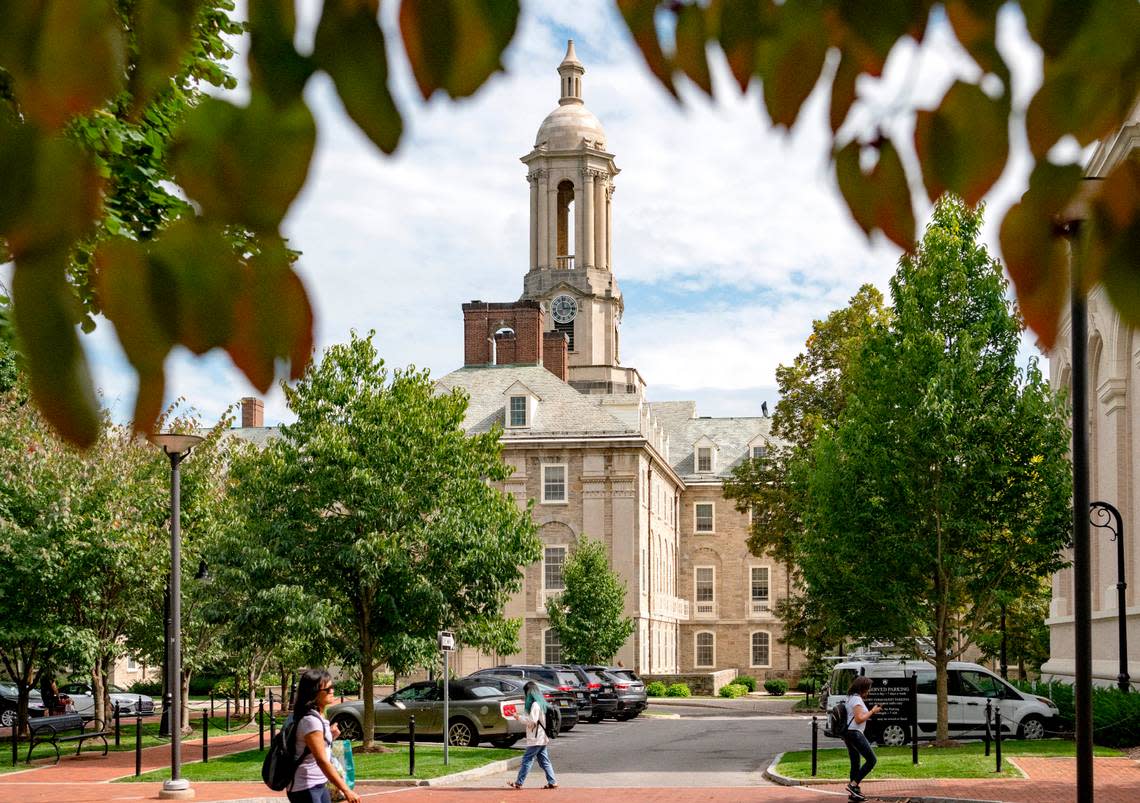Penn State’s ‘tough’ budget situation leads to few layoffs as university tackles finances

- Oops!Something went wrong.Please try again later.
Nine months after publicly acknowledging the likelihood of future layoffs, due to a mulitimillion-dollar budget deficit, Penn State confirmed it has laid off fewer than 10 full-time employees.
According to a spokesperson, fewer than 10 layoffs have occurred universitywide, which was markedly less than the 50 full-time jobs that university President Neeli Bendapudi said “may be” in jeopardy during an April 25 faculty senate meeting. Bendapudi said as early as last September there would be no mass layoffs.
“Given the small number of layoffs, we are not sharing individual college, campus or unit numbers, but there were fewer than 10 layoffs in total across the university and all of these staff members have been notified,” university spokesman Wyatt DuBois wrote in an email Thursday. “All units are continuing to work on balancing their budgets for the next two fiscal years.”
Still, layoffs alone may not tell the full story of the impact of the the university’s financial woes, given the more than $140 million budget deficit this past fiscal year.
In addition to layoffs of full-time employees, Penn State has also turned to attrition — or simply not filling open positions — along with considering delaying program launches, deferring purchases or improvements, eliminating programs, reducing part-time and contract positions, restructuring, and taking on new ventures to increase revenues (e.g. corporate sponsorship programs). One source within engineering told the CDT that an engineering department had discussed cutting its number of teaching assistants by at least 25%.
DuBois said the number of teaching assistantships impacted universitywide could not yet be confirmed.
A June 2 email from the dean of University Park’s College of Engineering, obtained by the CDT, acknowledged the mounting challenges. (The email to faculty and staff also confirmed an unspecified number of full-time engineering employees were among those impacted by layoffs.)
“For those who continue in their roles following the unplanned departure of co-workers and friends, I recognize that attrition — individuals departing because of retirement or for other opportunities — and now layoffs have created growing operational challenges across the college,” Dean Anthony Atchley said in the email, which also shared a link to resources such as short-term counseling. “With decreased staffing levels, we are committed to adjusting and reprioritizing where necessary.”
Bendapudi officially took over in May 2022, replacing President Eric Barron, whose former provost acknowledged in April 2022 the university was going through a “difficult budgetary period.” Bendapudi implemented a strategic hiring freeze in August 2022, the 2022-2023 operating budget was presented two months later than usual in September 2022 to allow for more budgetary revisions, and Bendapudi publicly addressed the the “tough budget situation” during a town hall in mid-September.
Bendapudi promised to balance the budget by 2025. By December, she announced changes to the budget allocation process, which another official had characterized as not keeping up with changes to enrollment and university priorities. Before, the process was simply done in an incremental fashion, meaning colleges generally received a similar amount as the year before. Now, budget allocations are more dynamic and based on a model using data involving student headcounts, credit hours, tuition and research expenditures.
“It’s hard to say that’s an irrational approach,” Craig Newschaffer, dean of the College of Health and Human Development, told the CDT last month. “... The devil in the challenge, as always, is in the implementation.”
Although no college’s base budget allocation saw more than a 4% decrease on paper for the next fiscal year; in practice, at least two colleges’ overall budgets still had to be slashed by at least 15%, according to four faculty members who took part in the University Park town halls of their respective colleges.
The university acknowledged that possibility in a previous email to the CDT, writing that a college’s total income (e.g. gifts and grants) isn’t factored into the base budgets and could’ve decreased. Another possibility is the unit could’ve previously operated under a structural deficit.
It is unknown at this point whether future layoffs remain a possibility for the new fiscal year starting July 1 and ending June 30, 2024. The extent of the reduction in employees, compared to this time last year, was also not immediately known.
Bendapudi is expected to present budget proposals for the next two fiscal years to the university’s board of trustees on July 21 at Penn Behrend.

